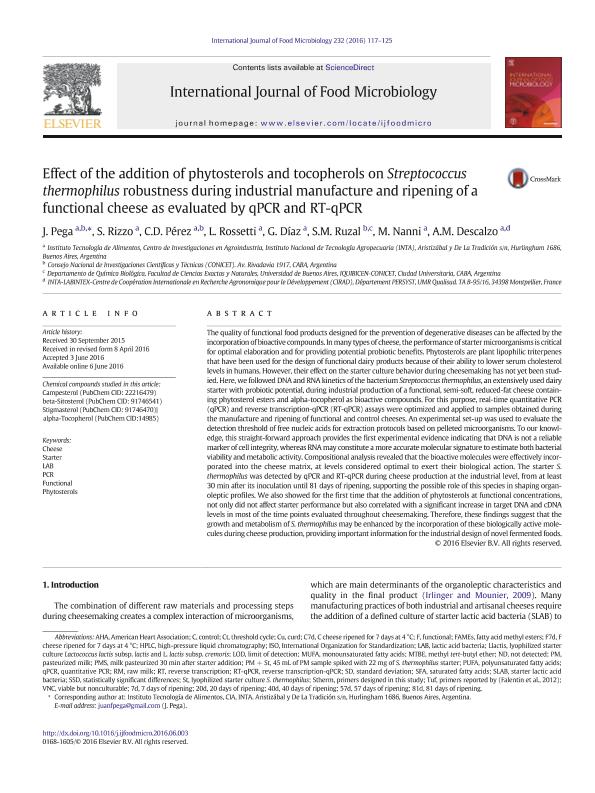Mostrar el registro sencillo del ítem
dc.contributor.author
Pega, Juan Franco

dc.contributor.author
Rizzo, Sergio Anibal

dc.contributor.author
Pérez, Carolina Daiana

dc.contributor.author
Rossetti, Luciana

dc.contributor.author
Díaz, Gabriela
dc.contributor.author
Ruzal, Sandra Mónica

dc.contributor.author
Nanni, Mariana Sandra

dc.contributor.author
Descalzo, Adriana Maria

dc.date.available
2018-05-28T15:50:08Z
dc.date.issued
2016-06
dc.identifier.citation
Pega, Juan Franco; Rizzo, Sergio Anibal; Pérez, Carolina Daiana; Rossetti, Luciana; Díaz, Gabriela; et al.; Effect of the addition of phytosterols and tocopherols on Streptococcus thermophilus robustness during industrial manufacture and ripening of a functional cheese as evaluated by qPCR and RT-qPCR; Elsevier Science; International Journal of Food Microbiology; 232; 6-2016; 117-125
dc.identifier.issn
0168-1605
dc.identifier.uri
http://hdl.handle.net/11336/46255
dc.description.abstract
The quality of functional food products designed for the prevention of degenerative diseases can be affected by the incorporation of bioactive compounds. In many types of cheese, the performance of starter microorganisms is critical for optimal elaboration and for providing potential probiotic benefits. Phytosterols are plant lipophilic triterpenes that have been used for the design of functional dairy products because of their ability to lower serum cholesterol levels in humans. However, their effect on the starter culture behavior during cheesemaking has not yet been studied. Here, we followed DNA and RNA kinetics of the bacterium Streptococcus thermophilus, an extensively used dairy starter with probiotic potential, during industrial production of a functional, semi-soft, reduced-fat cheese containing phytosterol esters and alpha-tocopherol as bioactive compounds. For this purpose, real-time quantitative PCR (qPCR) and reverse transcription-qPCR (RT-qPCR) assays were optimized and applied to samples obtained during the manufacture and ripening of functional and control cheeses. An experimental set-up was used to evaluate the detection threshold of free nucleic acids for extraction protocols based on pelleted microorganisms. To our knowledge, this straight-forward approach provides the first experimental evidence indicating that DNA is not a reliable marker of cell integrity, whereas RNA may constitute a more accurate molecular signature to estimate both bacterial viability and metabolic activity. Compositional analysis revealed that the bioactive molecules were effectively incorporated into the cheese matrix, at levels considered optimal to exert their biological action. The starter S. thermophilus was detected by qPCR and RT-qPCR during cheese production at the industrial level, from at least 30min after its inoculation until 81days of ripening, supporting the possible role of this species in shaping organoleptic profiles. We also showed for the first time that the addition of phytosterols at functional concentrations, not only did not affect starter performance but also correlated with a significant increase in target DNA and cDNA levels in most of the time points evaluated throughout cheesemaking. Therefore, these findings suggest that the growth and metabolism of S. thermophilus may be enhanced by the incorporation of these biologically active molecules during cheese production, providing important information for the industrial design of novel fermented foods.
dc.format
application/pdf
dc.language.iso
eng
dc.publisher
Elsevier Science

dc.rights
info:eu-repo/semantics/openAccess
dc.rights.uri
https://creativecommons.org/licenses/by-nc-sa/2.5/ar/
dc.subject
Cheese
dc.subject
Starter
dc.subject
Lab
dc.subject
Pcr
dc.subject
Functional
dc.subject
Phytosterol
dc.subject.classification
Alimentos y Bebidas

dc.subject.classification
Otras Ingenierías y Tecnologías

dc.subject.classification
INGENIERÍAS Y TECNOLOGÍAS

dc.title
Effect of the addition of phytosterols and tocopherols on Streptococcus thermophilus robustness during industrial manufacture and ripening of a functional cheese as evaluated by qPCR and RT-qPCR
dc.type
info:eu-repo/semantics/article
dc.type
info:ar-repo/semantics/artículo
dc.type
info:eu-repo/semantics/publishedVersion
dc.date.updated
2018-05-28T14:51:16Z
dc.journal.volume
232
dc.journal.pagination
117-125
dc.journal.pais
Países Bajos

dc.journal.ciudad
Amsterdam
dc.description.fil
Fil: Pega, Juan Franco. Consejo Nacional de Investigaciones Científicas y Técnicas; Argentina. Instituto Nacional de Tecnología Agropecuaria. Centro de Investigación de Agroindustria. Instituto de Tecnología de Alimentos; Argentina
dc.description.fil
Fil: Rizzo, Sergio Anibal. Instituto Nacional de Tecnología Agropecuaria. Centro de Investigación de Agroindustria. Instituto de Tecnología de Alimentos; Argentina
dc.description.fil
Fil: Pérez, Carolina Daiana. Consejo Nacional de Investigaciones Científicas y Técnicas; Argentina. Instituto Nacional de Tecnología Agropecuaria. Centro de Investigación de Agroindustria. Instituto de Tecnología de Alimentos; Argentina
dc.description.fil
Fil: Rossetti, Luciana. Instituto Nacional de Tecnología Agropecuaria. Centro de Investigación de Agroindustria. Instituto de Tecnología de Alimentos; Argentina
dc.description.fil
Fil: Díaz, Gabriela. Instituto Nacional de Tecnología Agropecuaria. Centro de Investigación de Agroindustria. Instituto de Tecnología de Alimentos; Argentina
dc.description.fil
Fil: Ruzal, Sandra Mónica. Consejo Nacional de Investigaciones Científicas y Técnicas. Oficina de Coordinación Administrativa Ciudad Universitaria. Instituto de Química Biológica de la Facultad de Ciencias Exactas y Naturales. Universidad de Buenos Aires. Facultad de Ciencias Exactas y Naturales. Instituto de Química Biológica de la Facultad de Ciencias Exactas y Naturales; Argentina
dc.description.fil
Fil: Nanni, Mariana Sandra. Instituto Nacional de Tecnología Agropecuaria. Centro de Investigación de Agroindustria. Instituto de Tecnología de Alimentos; Argentina
dc.description.fil
Fil: Descalzo, Adriana Maria. Instituto Nacional de Tecnología Agropecuaria. Centro de Investigación de Agroindustria. Instituto de Tecnología de Alimentos; Argentina. Centre de Coopération Internationale en Recherche Agronomique pour le Développement; Francia
dc.journal.title
International Journal of Food Microbiology

dc.relation.alternativeid
info:eu-repo/semantics/altIdentifier/doi/http://dx.doi.org/10.1016/j.ijfoodmicro.2016.06.003
dc.relation.alternativeid
info:eu-repo/semantics/altIdentifier/url/https://www.sciencedirect.com/science/article/pii/S0168160516302951
Archivos asociados
